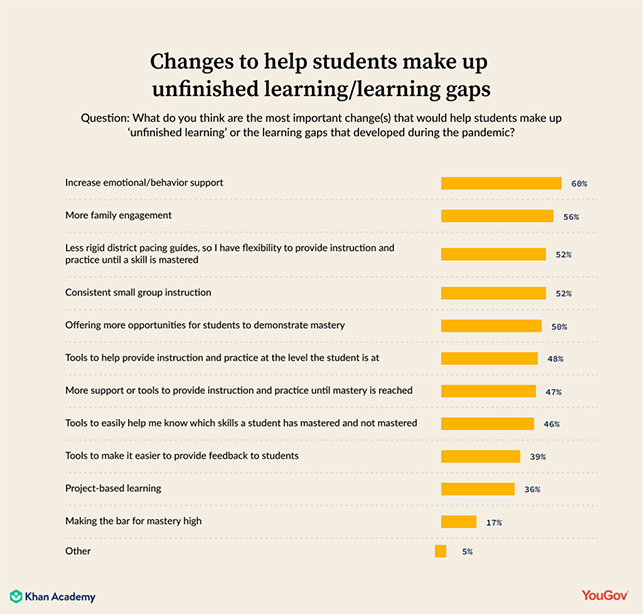Teachers Favor Mastery Learning Methods in Pandemic Recovery Efforts, Survey Shows
- By Kristal Kuykendall
- 07/26/22
As the nation’s public schools grapple with helping students overcome learning losses exacerbated by pandemic closures, a long-simmering movement toward competency-based education — sometimes called “mastery learning” — appears to be gaining ground among teachers, according to a new survey by Khan Academy and market research firm YouGov.
The survey results, published and discussed today in a Khan Academy blog post, show that 84% of respondents believe that mastery learning can help address learning loss resulting from the pandemic, and more than half of teachers responding said they are already using mastery learning in their classrooms.
An additional 35% of respondents said they would like to use mastery learning in their teaching.
Unlike in traditional classrooms, a student in mastery-learning or competency-based classrooms are not pushed ahead to the next subject or lesson until the student demonstrates knowledge or “mastery” of the current lesson. “Mastery learning allows students to progress at a pace that’s right for them under the watchful eye of expert teachers who make decisions about instruction,” said the Khan Academy blog.
The survey, conducted in May with 639 K–12 teachers participating from across the United States, reveals a wide gap between what teachers believe will help students most and the teaching methods they are still practicing, the traditional classroom format and letter-grade system expected in public schools.
While a majority of educators agreed that mastery learning can help address learning loss, 84% of respondents said they are still using the traditional grading system to track student progress, and 71% agreed that letter grades “provide an incentive for students to succeed,” Khan Academy said.
Respondents also noted the “negative aspects” of the traditional letter-grade system:
- 61% agreed that Ds and Fs cause students to lose motivation.
- 58% agreed that letter grades result in students being labeled.
- 46% of teachers agreed that letter grades are an unfair way to evaluate students.
Almost all the teachers participating in the survey reported they have been able to identify learning gaps that need to be addressed, according to the results. Just 59% of respondents said their students mastered the content they needed to during the last school year.
Additional findings from the survey, Khan Academy said, included:
- Teachers would like to spend, on average, an additional 3.6 hours providing feedback every week.
- Teachers want more flexibility — for example, less rigid pacing expectations — to spend extra time on a concept or particularly difficult lesson if it’s needed.
- Teachers would like to allow students to retake tests.
- The best way to identify learning gaps and help students catch up is through one-on-one time during class, teachers said.

Learn more at the Khan Academy blog.
About the Author
Kristal Kuykendall is editor, 1105 Media Education Group. She can
be reached at [email protected].